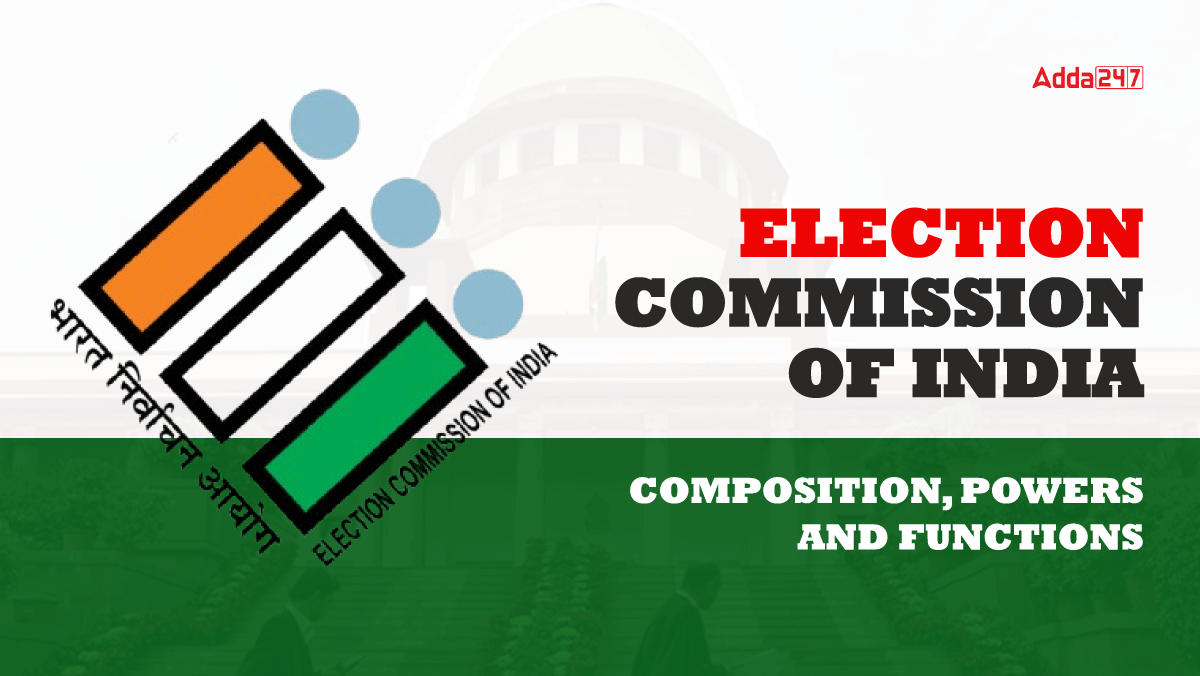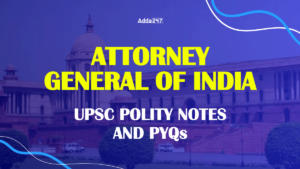Table of Contents
Free and fair elections are of utmost importance in a democratic country and it would be no wrong to say that it becomes a tough job to be done in the largest democracy of the world i.e. India, to make elections free and fair in India, Election Commission of India plays a crucial role, it should be noted that it is common to both the Central and the State government.
Election Commission of India (UPSC Notes)
In this article, we will discuss the composition, independence, functions, powers, and role of the Election Commission in detail. As this is an important topic for the UPSC Prelims and Mains GS Paper 2, our goal is to help candidates excel in the exam by providing comprehensive Election Commission of India UPSC Notes. Candidates can also find a link to download the ECI UPSC Notes within the article.
Composition of Election Commission of India :
Article 324 of the constitution deals with the provisions with reference to the Election Commission of India
- Election Commission consists of Chief Election Commissioner and Election Commissioners.
- Appointments are made by The President.
- Chief Election Commissioner act as chairman of the election commission.
- The President can also appoint the regional commissioners.
- Condition of service and tenure of the election commissioners and regional commissioners is determined by the president.
- Election Commission used to be a single member body till 1989 and consisted only Chief Election Commissioner.
- In 1989 with the 61st Amendment when the voting age was lowered to 18 years from 21 years, The President appointed 2 more election commissioners to handle the increased work load.
- Chief Election Commissioner and the other 2 commissioners are entitled to same powers, salary, allowances and other benefits similar to that of the supreme court judge.
- In case if there is any conflict between the commissioners the matter is decided by the majority.
Independence of Election Commission of India :
Election Commission is a constitutional body established under the constitution of India and as we have before read about the Salient features of Indian Constitution, that it ensures the fact that the body remains independent.
- Chief Election Commissioner is provide with the security of tenure, his term is of 6 years or till they attain the of 65 (whichever is earlier)
- He can be removed following the same process as for the judge of supreme court of India.
- This mean that the President will himself have to get the resolution passed from both the houses with special majority.
- The service conditions of the commissioners can not be altered to their disadvantage.
- Any election commissioner or regional commissioner can not be removed except for the recommendation from the chief election commissioner.
Limitations of the Election Commission :
The constitution has successfully safeguards the independence of the election commission but following flaws remain to the date:
- No qualification has been prescribed by the constitution for the member of the commission.
- Term of members has not been specified by the constitution.
- Constitution doesn’t debars the retiring election commissioners from further appointments as done in case of the UPSC chairman and members.
Powers of Election Commission of India :
Hereinafter we will be discussing about the Powers and Functions of the Election Commission of India
- The powers vested with the Election commission can be bifurcated into :
- Administrative powers
- Advisory powers
- Quasi-Judicial powers
- Election commission determines the area of electoral constituency on the basis of the Delimitation Commission Act.
- Election Commission is responsible for electoral rolls and registration of all eligible voters.
- Election Commission notifies dates and scrutinize the nomination of candidates.
- It also grants recognition to political parties and granting them the status of the national or state parties.
- It is responsible to determine and implement the code of conduct.
- To advise advise president on matters related to disqualification of members of parliament.
- To advise advise Governor on matters related to disqualification of members of Legislative assembly.
- Election Commission can also cancel the elections in case of any rigging activity is reported.
- Election commission can also seek for staff attachment required to conduct the elections from the president or the governor.
- To advise the president on election matters in case of the presidents rule.
- Election commission is assisted by the Chief electoral officer, appointed in states in consultation with the chief minister and the state government and at the district level the Collector acts as the returning officer.
Functions of ECI :
- To direct and control the entire process of conducting elections to Parliament and Legislature of every State and to the offices of President and Vice-President of India.
- To prepare electoral roll and issues Electronic Photo Identity Card (EPIC)
- Issue Model Code of Conduct along with the guidelines
- Ensure no abuse of powers by those in power
- Election Commission of India is also responsible for setting up the limit on expenditure by an individual candidate.
- It also deals with appointment of officers for inquiring into disputes related to the disputes in the election process.
Role of Election Commission of India
Election commission strives to maintain integrity of the elections being conducted and assures that –
- impartiality is maintained throughout the process
- election are transparent along with being free and fair
- all eligible citizens participate in the process
- all parties and stakeholders are considered while makin any change to the electoral process
- confidence is strengthened over the electoral system
- all human capital and resources involved are utilized effectively
- quality infrastructure for elections along with adoption of new technologies for smooth process
UPSC Mains PYQs for Election Commission of India (ECI)
Candidates who have read the above Election Commission Of India (ECI) UPSC Notes should give a attempt to the UPSC Mains PYQs for Election Commission of India in order to check their learning and understanding about the Election Commission of India with respect to the UPSC Mains Exam.
-
Discuss the role of the Election Commission of India in the light of the evolution of the Model Code of Conduct. (2023)
- Discuss the role of the Election Commission of India in light of the evolution of the Model Code of Conduct. (250 words) (2022, 15 Marks)
- In light of the recent controversy regarding the use of Electronic Voting Machines (EVM), what are the challenges before the Election Commission of India to ensure the trustworthiness of elections in India? (2018, 10 Marks )
- To enhance the quality of democracy in India the Election Commission of India has proposed electoral reforms in 2016. What are the suggested reforms and how far are they significant to make democracy successful? (250 words) (2017)
- What are the steps that the Election Commission may take if a recalcitrant State Government wants to put off Assembly Elections? (150 words) (2005)
- How is the Election commission constituted (2004)
![Election Commission of India: Powers, Functions, and Role in Indian Democracy [UPSC Notes]_0.1](https://www.adda247.com/jobs/wp-content/uploads/sites/4/2022/09/07190045/upsc.png)

![Election Commission of India: Powers, Functions, and Role in Indian Democracy [UPSC Notes]_3.1](https://www.adda247.com/jobs/wp-content/uploads/sites/4/2025/05/26110856/Prime-Test-3.webp)
 Attorney General of India UPSC Notes (Ar...
Attorney General of India UPSC Notes (Ar...
 Election Laws in India UPSC Notes
Election Laws in India UPSC Notes
 Indian Parliamentary Forums UPSC Notes
Indian Parliamentary Forums UPSC Notes
